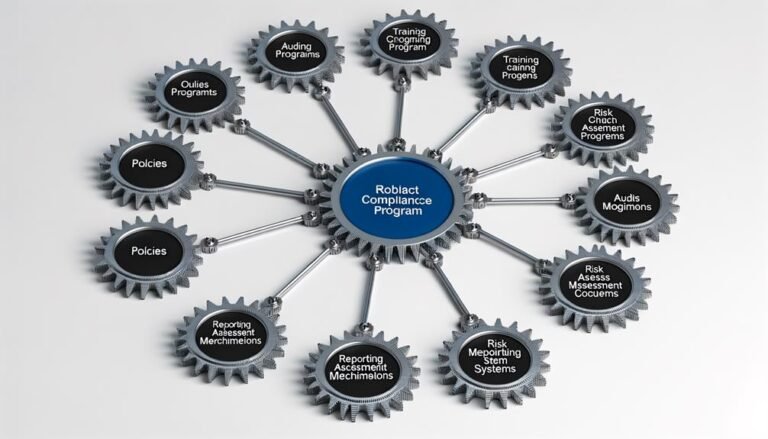Negotiation Skills for Innovative Leaders
You may be thinking that negotiation skills are only necessary for traditional business settings, but in today's rapidly evolving and interconnected world, innovative leaders must also master the art of negotiation.
As a leader, you are constantly faced with complex challenges that require collaboration, creativity, and strategic decision-making. Negotiation skills are essential in navigating these challenges and driving successful outcomes.
From fostering effective communication to embracing creativity in problem-solving, the ability to negotiate is a critical skill set for leaders who strive to innovate and adapt in dynamic environments.
Understanding how negotiation psychology, power dynamics, and cultural differences influence outcomes can set you apart as a leader who can navigate uncertainty and drive meaningful change.
Mastering negotiation skills is not just about reaching agreements; it's about shaping the future and leading with innovation.
Key Takeaways
- Perceptions of fairness and maintaining relationships are crucial in negotiation outcomes for innovative leaders.
- Feeling a sense of control and utilizing negotiation tactics such as strategic concessions and framing offers can influence decision-making.
- Effective communication, including active listening and assertive communication, builds rapport, trust, and fosters a positive and cooperative atmosphere.
- Leveraging power dynamics requires understanding psychological factors, utilizing influence tactics, and reflecting on ethical implications, while prioritizing win-win solutions and long-term success.
Understanding Negotiation Psychology
Understanding negotiation psychology is crucial in navigating the complexities of deal-making. Negotiation tactics and psychological techniques play a significant role in shaping the outcome of any negotiation. People's decisions during negotiations are often influenced by a variety of psychological factors, such as their perceptions of fairness, their desire to maintain relationships, and their need to feel a sense of control.
Negotiation tactics encompass a wide range of strategies used to influence the other party's decision-making process. These tactics can include making strategic concessions, framing offers in a compelling manner, and leveraging power dynamics to gain an advantage.
On the other hand, psychological techniques delve into the realm of human behavior and cognition, tapping into principles such as reciprocity, social proof, and anchoring to sway the direction of negotiations.
Effective Communication Strategies
Effective communication strategies are essential in building rapport and trust during negotiations, enabling you to convey your position persuasively and understand the other party's perspective.
Active listening is a crucial component of effective communication. It involves fully concentrating, understanding, responding, and remembering what's being said. By actively listening, you show respect and consideration for the other party's viewpoint, fostering a positive and cooperative atmosphere. This can lead to more open and honest discussions, ultimately aiding in finding mutually beneficial solutions.
Additionally, assertive communication is key to clearly expressing your needs and goals while respecting the needs of the other party. It involves confidently and respectfully articulating your thoughts, feelings, and boundaries. This approach can help prevent misunderstandings and build a foundation of mutual respect.
Building Trust and Rapport
You can build trust and rapport by:
- Establishing rapport quickly
- Using nonverbal communication cues
- Implementing trust-building strategies
These skills are crucial for creating an environment where both parties feel understood and valued, leading to more successful negotiations.
Establishing Rapport Quickly
Upon meeting someone new, swiftly establishing rapport is crucial for building trust and fostering effective communication. To establish trust quickly, use active listening and show genuine interest in the other person. Maintain eye contact, nod, and use verbal affirmations to show that you're engaged in the conversation. Mirroring the other person's body language can also help create a sense of connection.
Additionally, find common ground by asking open-ended questions and sharing relevant experiences. Always be mindful of your nonverbal cues, as they play a significant role in building rapport. By employing these communication techniques, you can create a positive and trusting atmosphere from the outset, laying the groundwork for successful interactions and negotiations.
Nonverbal Communication Cues
As you engage in conversations and negotiations, your nonverbal communication cues play a pivotal role in establishing trust and rapport with others. Body language is a powerful tool that can significantly impact negotiation success.
Here are five essential nonverbal communication cues to help you build trust and rapport:
- Maintain good eye contact to convey confidence and attentiveness.
- Use open and welcoming gestures to create a sense of openness and approachability.
- Pay attention to your facial expressions, as they can reveal emotions and intentions.
- Mirror the body language of the other party to establish a connection and build rapport.
- Be mindful of your posture, as standing or sitting upright exudes confidence and professionalism.
Mastering these nonverbal cues can enhance your ability to connect with others and foster successful negotiations.
Trust-Building Strategies
To build trust and rapport in negotiations, actively listen to the concerns and perspectives of the other party, demonstrating your genuine interest in understanding their needs and objectives.
Utilize trust-building techniques such as being transparent and honest in your communication. Establishing credibility through consistency in your words and actions is also crucial.
Relationship-building strategies like finding common ground and showing empathy can help create a positive connection. Additionally, acknowledging the other party's expertise and achievements fosters mutual respect and trust.
Building trust and rapport takes time and effort, so be patient and persistent in your approach. By employing these trust-building techniques and relationship-building strategies, you can lay a solid foundation for successful negotiations and long-term partnerships.
Leveraging Power Dynamics
Now, let's talk about leveraging power dynamics.
It's crucial to be aware of power dynamics, strategically balance power, and influence without coercion.
These are essential skills for innovative leaders to navigate negotiations and achieve successful outcomes.
Power Dynamics Awareness
Understanding power dynamics in negotiations is essential for effective leadership and successful outcomes. In negotiations, power dynamics play a crucial role in shaping the direction and results of the discussion. Being aware of these dynamics allows you to leverage them to your advantage and achieve mutually beneficial agreements. Here are some key points to consider:
- Social Psychology: Understand the psychological factors that influence power dynamics and how they impact negotiation outcomes.
- Influence Tactics: Learn about different tactics for exerting influence in negotiations and how to counterbalance them.
- Nonverbal Cues: Pay attention to nonverbal cues and signals that indicate shifts in power dynamics during negotiations.
- Power Mapping: Utilize power mapping techniques to identify sources of power and influence within the negotiation context.
- Ethical Considerations: Reflect on the ethical implications of leveraging power dynamics and strive for fair and equitable negotiations.
Strategic Power Balance
Leveraging power dynamics strategically in negotiations involves recognizing and capitalizing on shifts in influence to achieve favorable outcomes. To maintain a strategic power balance, employ tactics such as information control, building alliances, and understanding the other party's sources of power.
Seek to level the playing field by enhancing your own sources of power through expertise, relationships, and alternatives. Simultaneously, assess the other party's power dynamics strategies and adapt your approach accordingly.
Recognize when to assert your power and when to yield to maintain a balanced and constructive negotiation environment. By strategically managing power dynamics, you can create opportunities for mutual gain and foster long-term collaborative relationships.
Understanding and applying these strategic negotiation tactics will enhance your ability to navigate complex negotiations effectively.
Influence Without Coercion
To influence without coercion in negotiations, strategically utilize your sources of power and understand the other party's dynamics to achieve mutually beneficial outcomes. Leveraging power dynamics requires finesse and insight.
To ensure successful influence, consider the following techniques:
- Build rapport: Establishing a positive relationship can enhance your ability to persuade.
- Active listening: Understanding the other party's needs and concerns is crucial for effective persuasion.
- Framing: Present your ideas in a way that resonates with the other party's values and objectives.
- Social proof: Utilize evidence or testimonials to validate your proposals and build credibility.
- Reciprocity: Offering concessions or demonstrating goodwill can encourage the other party to reciprocate.
Crafting Win-Win Solutions
Crafting win-win solutions requires understanding the needs and motivations of all parties involved to ensure mutual benefit and satisfaction. By employing collaborative problem solving and creative compromise, innovative solutions can be achieved. Consider the following key elements when crafting win-win solutions:
| Key Elements | Description |
|---|---|
| Understanding Motivations | Take the time to understand the underlying motivations and interests of all parties involved. |
| Identifying Common Ground | Identify areas where the parties' interests align to establish a foundation for mutual gain. |
| Brainstorming Solutions | Encourage open dialogue and creativity to generate solutions that address the needs of all parties. |
Crafting win-win solutions is not about one party winning at the expense of another. It's about finding creative and innovative ways to address the concerns and interests of all parties, leading to outcomes that are satisfactory to everyone involved. By approaching negotiations with a mindset focused on mutual gain and collaborative problem solving, you can foster a positive and productive environment where win-win solutions can flourish.
Managing Conflict Constructively
When managing conflict constructively, it's important to have effective conflict resolution strategies in place.
Building positive relationships can help prevent conflicts from escalating and create a more collaborative environment.
Conflict Resolution Strategies
Effective conflict resolution strategies play a crucial role in maintaining a harmonious and productive work environment. When conflicts arise, it's essential to handle them constructively to prevent negative impacts on the team and organization. Here are five key strategies for managing conflict and resolving disputes:
- Active Listening: Practice attentive and empathetic listening to understand the underlying concerns and perspectives of all parties involved.
- Clear Communication: Encourage open and honest communication to express feelings, address issues, and seek common ground for resolution.
- Collaborative Problem-Solving: Foster a collaborative approach where conflicting parties work together to find mutually beneficial solutions.
- Emotional Intelligence: Recognize and manage emotions effectively to de-escalate tense situations and promote understanding.
- Mediation and Facilitation: Utilize neutral third parties to help guide the resolution process and facilitate productive discussions.
Building Positive Relationships
To build positive relationships and manage conflict constructively, it is essential to prioritize open communication and mutual respect among team members. Relationship building and collaboration techniques are vital for creating a cohesive and productive work environment. Trust development and partnership cultivation are equally important to ensure that conflicts are handled constructively and do not hinder the team's progress. By fostering an atmosphere of trust and open communication, team members are more likely to address conflicts in a respectful and solution-oriented manner. This approach can lead to stronger and more positive working relationships, ultimately enhancing the team's ability to innovate and achieve its goals.
| Relationship Building | Collaboration Techniques | Trust Development | Partnership Cultivation |
|---|---|---|---|
| Active Listening | Brainstorming Sessions | Transparent Communication | Joint Goal Setting |
| Empathy | Teamwork | Consistency | Shared Accountability |
| Conflict Resolution | Clear Communication | Reliability | Mutual Support |
Embracing Creativity in Problem-Solving
Embracing creativity in problem-solving allows leaders to explore unconventional solutions and break free from traditional constraints. When it comes to negotiating, creativity can open up new possibilities and lead to innovative problem-solving techniques.
Here are five ways to embrace creativity in problem-solving:
- Encourage brainstorming sessions where all ideas are welcomed without judgment.
- Foster a culture that values experimentation and risk-taking, allowing for unconventional approaches to problem-solving.
- Embrace diverse perspectives and seek input from team members with different backgrounds and expertise.
- Use visual aids such as mind maps, diagrams, or sketches to explore solutions from different angles.
- Challenge assumptions and traditional thinking by asking 'why' and 'what if' questions to uncover new insights.
Utilizing Persuasion and Influence
You can enhance your negotiation skills by mastering the art of utilizing persuasion and influence. Persuasion techniques are powerful tools that can help you sway opinions, gain cooperation, and achieve mutually beneficial outcomes. When utilized effectively, these techniques can significantly impact the success of your negotiations.
One key aspect of persuasion is understanding the psychology of decision-making and using this knowledge to frame your arguments in a compelling way. By appealing to the interests and needs of the other party, you can increase the likelihood of reaching a favorable agreement.
Influence tactics are another essential component of negotiation. These tactics involve utilizing various strategies to shape the perceptions and behaviors of others. Understanding the different types of influence, such as reciprocity, social proof, and authority, can empower you to effectively navigate complex negotiation scenarios. By strategically employing influence tactics, you can subtly guide the direction of the negotiation and create a more conducive environment for reaching agreements.
Mastering persuasion techniques and influence tactics can elevate your negotiation skills, enabling you to achieve optimal outcomes and build strong, collaborative relationships.
Adapting to Cultural Differences
Adapting to cultural differences requires a high level of awareness and sensitivity in your approach to negotiation. Cross-cultural negotiation involves understanding and respecting the values, customs, and communication styles of people from different cultural backgrounds. Intercultural communication plays a crucial role in this process, as it involves the exchange of information between individuals from diverse cultures.
To effectively adapt to cultural differences in negotiation, consider the following:
- Cultivate cultural intelligence: Develop an understanding of different cultural norms, beliefs, and practices.
- Practice active listening: Pay attention to verbal and non-verbal cues to comprehend the perspectives of individuals from diverse cultures.
- Flexibility in communication: Adjust your communication style to accommodate the preferences of individuals from different cultural backgrounds.
- Respect cultural differences: Show sensitivity and respect towards diverse cultural practices and beliefs during negotiations.
- Seek cultural mentors: Engage with individuals from different cultural backgrounds to gain insights and guidance on navigating cross-cultural negotiations.
Negotiating for Long-Term Success
To ensure long-term success in negotiations, prioritize understanding and respecting the values, customs, and communication styles of individuals from diverse cultural backgrounds.
Long-term strategy in negotiations involves more than just closing a deal; it's about building sustainable business relationships. When negotiating for long-term success, it's crucial to focus on creating mutually beneficial agreements that foster trust and collaboration.
Sustainable business negotiations require a forward-thinking approach that considers the impact of the deal on all parties involved. It's important to emphasize transparency and open communication to lay the foundation for enduring partnerships.
Additionally, incorporating flexibility into your negotiation tactics can help in adapting to changing circumstances and maintaining positive long-term relationships. By actively seeking win-win solutions and demonstrating a genuine interest in the well-being of all parties, you can establish a reputation as a trustworthy and reliable negotiator.
Ultimately, negotiating for long-term success involves a strategic mindset that values integrity, empathy, and the cultivation of enduring partnerships.
Conclusion
As an innovative leader, you have the power to shape the outcome of negotiations. By understanding the psychology of negotiation, communicating effectively, and building trust, you can create win-win solutions and drive long-term success.
Embrace creativity, leverage power dynamics, and adapt to cultural differences to influence and persuade others. You hold the keys to unlocking endless possibilities through the art of negotiation.
It's time to put your skills into action and watch the magic unfold.







